Archive Record
Images
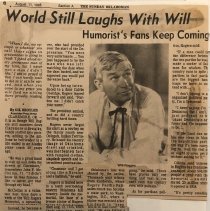
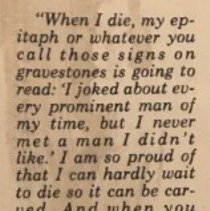
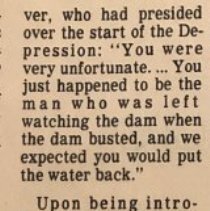
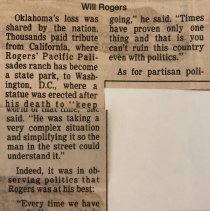
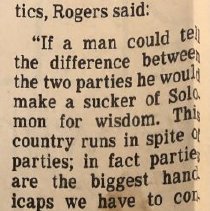
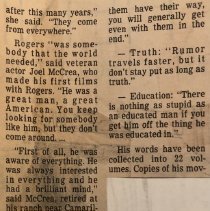
Additional Images [1]
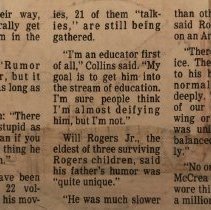
Metadata
Catalog Number |
2019.001.012 |
Object Name |
Clipping, Newspaper |
Title |
World Still Laughs With Will |
Collection |
Wiley Post Collection |
Creator |
Gil Broyles |
Scope & Content |
An article describing Will Rogers' life and time-resistant influence, giving some of his famous quotes. |
Date |
08/11/1985 |
Transcription |
[Top] August 11, 1985 Section A The Sunday Oklahoman [Article Heading and Content] World Still Laughs With Will Humorists Fans Keep Coming Back to Claremore Memorial After 50 Years "When I die, my epitaph or whatever you call those signs on gravestones is going to read: ‘I joked about every prominent man of my time, but I never met a man I didn’t like.’ I am so proud of that I can hardly wait to die so it can be carved. And when youcom e to my grave you will find me sitting there proudly reading it." —— By Gil Broyles Associated Press Writer CLAREMORE, OK -- It is as though Will Rogers still saunters down Claremore sidewalks, hands stuffed into pockets, adding to the millions he befriended in a life ended in an Alaska plane crash 50 years ago. "He was a great hand to visit up and down the streets of Claremore," remembers John F. McClellan, 71. "I didn’t know he was famous. I like to never got that through my head." McClellan is a volunteer host three days a week at the Will Rogers Memorial, a ... [[the rest of the text is folded under]]. Instead, he became a master roper. Eventually, Rogers’ lariat-twirling act in cowboy garb made him a Ziegfield Follies favorite. His comic routines led him to silent movie roles and a move to California. As his fame spread, Rogers’ homespun views of politics and popular culture made him an internationally known columnist and radio commenter. He played polo with the king of Spain and kidded presidents. He told Herbert Hoover, who was presided over the start of the Depression: "You were very unfortunate. ... You just happened to be the man who was left watching the dam when the dam busted, and we expected you would put the water back." Upon being introduced to a dour Calvin Coolidge, Rogers leaned forward and said, "Pardon me. I didn’t catch your name." The president smiled, and so did a country battling hard times. Rogers never forgot his start as a cowboy on the family ranch near Oologah, Indian Territory. He honed his country image of Oklahoma drawl and crinkled, weatherbeaten face with rumpled clothes, slapdash speech and intermittent punctuation. "Grammar and I get along like a Russian and a bathtub," he said. Rogers is buried here in a tomb overlooking eastern Oklahoma hill country. Inside the memorial, the base of a bronze statue of Rogers [[text is folded under]] ... died Aug. 15, 1935, when their seaplane, nose-heavy with specially fitted pontoons, crashed in shallow water off Point Barrow, Alaska. It was an ironic end for two men whose fervor for aviation helped make commercial air travel routine. Post, a barnstorming pilot from Maysville, OK, twice made around the world flights and set altitude records while wearing the pressurized suit he had invented. The suit and his airplane, the Winnie Mae, are at the Smithsonian Institution. He was 37. Oklahoma’s loss was shared by the nation. Thousands paid tribute from California, where Rogers’ Pacific Palisades ranch has become a state park, to Washington, D.C., where a statue was erected after his death to "keep ... [[text is folded under]]. ... world of that time," she said. "He was taking a very complex situation and simplifying it so the man in the street could understand it." Indeed, it was in observing politics that Rogers was at his best: "Every time we have an election, we get in worse men and the country keeps right on going." he said. "Times have proven only one thing and that is you can’t ruin this country even with politics." As for partition politics, Rogers said: "If a man could tell the difference betwen the two parties he would make a sucker of Solomon for wisdom. This country runs in spite of parties; in fact parties are the biggest handicap we have to contend with. ... "I don’t belong to an organized political party. I’m a Democrat. …" "I keep saying I’m a Democrat, but I ain’t. I just pretend to be ‘cause Democrats are funny and I’m supposed to be. … "If the Lord can see his way clear to bless the Republican party the way its been carrying on, then the rest of us ought to even get it without asking for it." Collins said interest in Rogers has continued unabated. About 500,000 people a year visit the memorial --an estimated 20 million since it opened in 1938. "It’s pretty amazing after this many years," she said. "They come from everywhere." Rogers "was somebody that the world needed," said veteran actor Joel McCrea, who made his first films with Rogers. "He was a great man, a great American. You keep looking for somebody like him, but they don’t come around. … "First of all, he was aware of everything. He was always interested in everything and he had a brilliant mind," said McCrea, retired at his ranch near Camarillo, Calif. "Seventy-five percent of the things he said will fit very well today. He had an advance intuition." Timeless witticisms rolled off Rogers’ tongue and out of his typewriter. — Civilization: "We have more toothpaste on the market and more misery in our courts than at any time our existence." — Women: "If you let them have their way, you will generally get even with them in the end." — Truth: "Rumor travels faster, but it don’t stay put as long as truth." — Education: "There is nothing as stupid as an educated man if you get him off the thing he was educated in." His words have been collected into 22 volumes. Copies of his movies, 21 of them "talkies," are still being gathered. "I’m an educator first of all." Collins said. "My goal is to get him into the stream of education. I’m sure people think I’m almost deifying him, but I’m not." Will Rogers Jr., the eldest of three surviving Rogers children, said his father’s humor was "quite unique." "He was much slower than other comedians," said Rogers who lives on an Arizona ranch. "There was no malice. There was no hate to his humor. Satirists normally hate rather deeply. Today, so much of our humor is left-wing or right-wing. He was unique in that he balanced it very easily." "No one took offense," McCrea said. "He never wore thin. He was one in a million." |
People |
Wiley Post Will Rogers Gil Broyles |
Search Terms |
Articles Humor Witicism Humor Satirist Truth Education Civilization Women Typewriter Claremore Wiley Post Herbert Hoover Will Rogers Gil Broyles Barnstorming Democrat |
